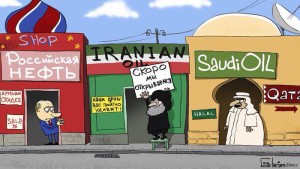
In the context of low oil prices and international sanctions, the Kremlin’s immediate interests and those of the oil industry are increasingly diverging. The government demands that oil output be frozen in the hope of boosting prices. Oil companies do not agree, but they have to publicly support the government’s decision.
Instead of reforming the country’s economy by curbing its dependence on energy revenues, the Russian regime keeps on dreaming about oil price recovery as the only possible way of overcoming the current crisis. The Kremlin believes that oil prices will recover if an agreement with the world’s major oil producers–first of all OPEC members–is reached. No one knows how to actually achieve that, however. Furthermore, it is hardly even possible: OPEC is not what it used to be. Its members cannot agree on an oil extraction freeze even between themselves, not to mention with Russia and the United States that are not OPEC members. In mid-February, Russian Energy Minister Alexander Novak undertook to convince Saudi Arabia, Qatar and Venezuela that oil output should be frozen. And he even succeeded in this undertaking, which the Russian media described as the greatest of victories. In reality, Novak only managed to persuade them to freeze oil production at the January 11, 2016 level, which is one of historical highs. The market reacted to this by a further collapse of oil prices.
This comes as no surprise, since an oil output reduction or freeze should be approved by all oil-producing countries. However, Iraq does not intend to reduce oil output, and Iran even plans to increase it. Moreover, Saudi Arabia that is currently producing oil at elevated levels and is trying to compensate for low prices by selling large volumes, is promising to keep oil production at its present level.
The Russian government is also having to convince Russia’s own oil producers to reduce production. In late February, the CEOs of the following companies were called in for a meeting with Putin at the Kremlin: Igor Sechin (Rosneft), Vagit Alekperov (Lukoil), Vladimir Bogdanov (Surgutneftegaz), Alexander Dyukov (Gazpromneft), Alexander Korsik (Bashneft), Sergei Kudryashov (Zarubezhneft), Nail Maganov (Tatneft), and Eduard Khudainatov (Independent Oil an Gas Company). They are having a difficult time: the finance ministry is demanding an increase in taxes; revenues have fallen; investment programs have been frozen; and foreign investments are absent and are not to be expected. What can they discuss with Putin? They can only ask him not to make things worse. But Putin himself has another interest: it is important for him to show that Russia is able to freeze production. Particularly since in February, all of Russia’s oil companies were growing their output. Off-the-record, oil producers are complaining to the media that freezing and especially reducing production will mean losing markets.
Rosneft CEO Igor Sechin, who is personally devoted to Putin, is the only one standing one from the crowd: he has also suddenly proposed reducing oil production. The real reason for this is that Rosneft’s output has long reached its peak and is now falling overall, despite the growth in February. This is why Sechin wants the others to reduce their output, too.
Oil producers are ready to freeze production if the government promises not to increase taxes. But the government is not ready to do this.
 In the end, after the Kremlin meeting Novak announced that oil companies and the government have reached an agreement. It is difficult to predict how this agreement will be implemented if world oil prices remain at a low level. In this situation, the only profitable thing for oil producers to do is pump as much as they can, while reducing costs. The question is how long will they be able to do this? The fact is that oil production in Russia will inevitably fall on its own, because the existing oil fields are becoming exhausted, and there are no funds or technologies to develop new ones–because of sanctions, Russian oil companies have no access to foreign investment or modern technology. It is naive to count on the proverbial import substitution in the extractive sector: even in the Soviet era, high-tech manufacturers in the USSR either worked under Western licenses, or simply stole and copied Capitalist prototypes. Russian oil companies will gradually lose their foreign markets, ceding them to Saudi Arabia, Qatar and Iran, which has recently been liberated from sanctions and which, in the years when high-tech equipment imports were banned, suffered a decline in oil refining and experienced problems with gasoline.
In the end, after the Kremlin meeting Novak announced that oil companies and the government have reached an agreement. It is difficult to predict how this agreement will be implemented if world oil prices remain at a low level. In this situation, the only profitable thing for oil producers to do is pump as much as they can, while reducing costs. The question is how long will they be able to do this? The fact is that oil production in Russia will inevitably fall on its own, because the existing oil fields are becoming exhausted, and there are no funds or technologies to develop new ones–because of sanctions, Russian oil companies have no access to foreign investment or modern technology. It is naive to count on the proverbial import substitution in the extractive sector: even in the Soviet era, high-tech manufacturers in the USSR either worked under Western licenses, or simply stole and copied Capitalist prototypes. Russian oil companies will gradually lose their foreign markets, ceding them to Saudi Arabia, Qatar and Iran, which has recently been liberated from sanctions and which, in the years when high-tech equipment imports were banned, suffered a decline in oil refining and experienced problems with gasoline.





